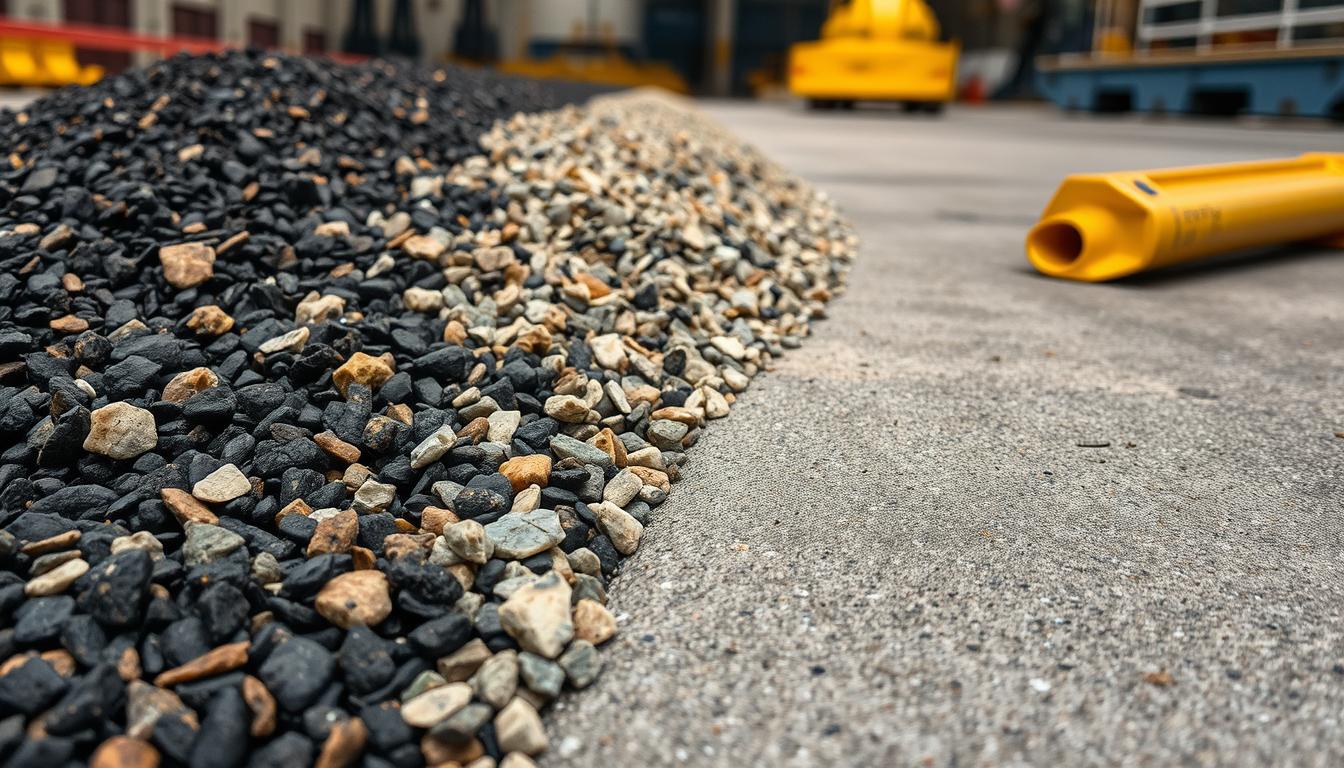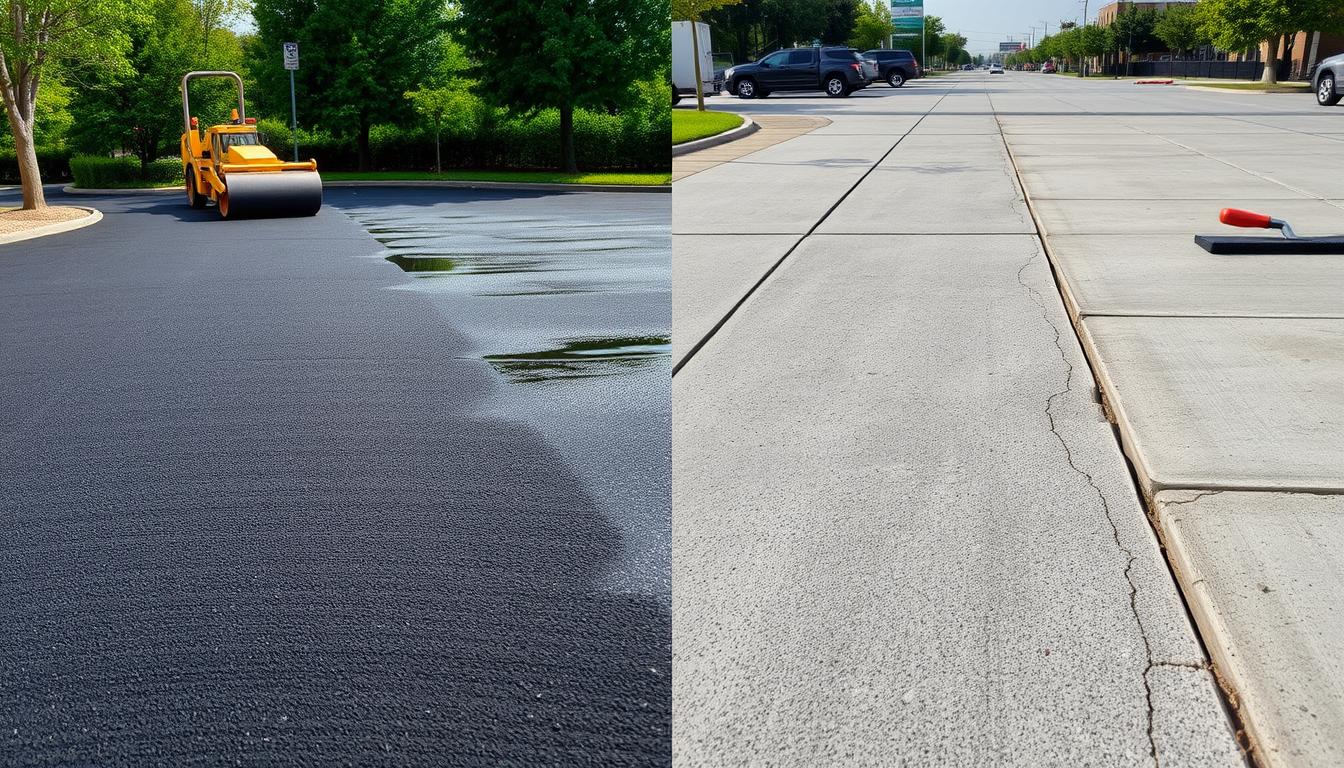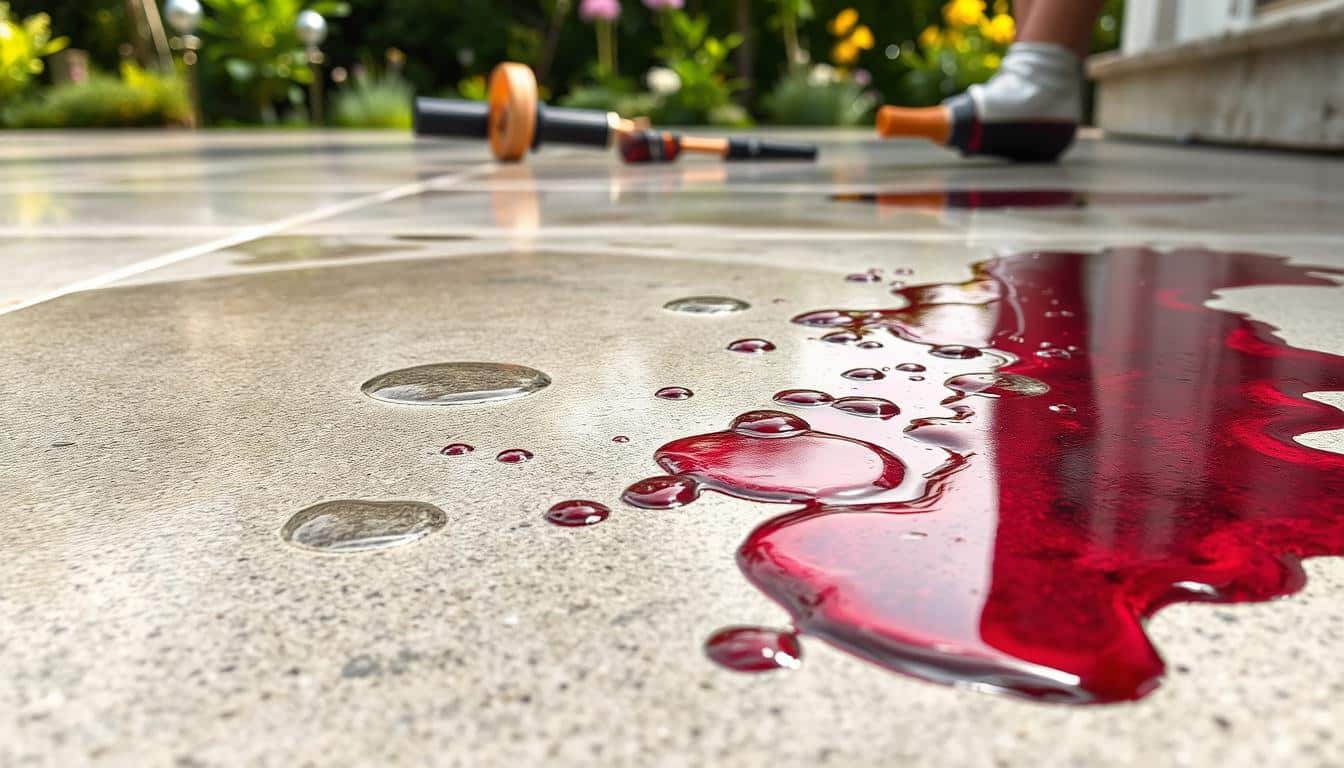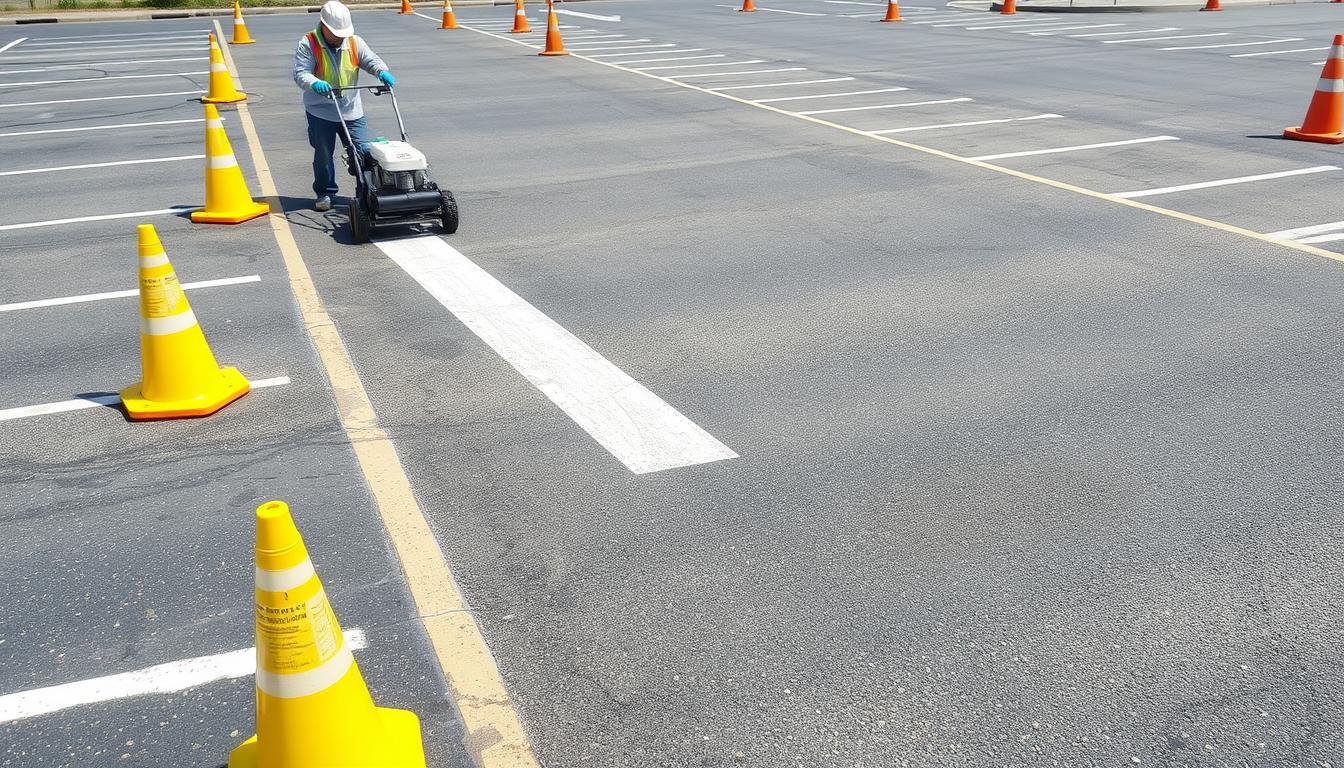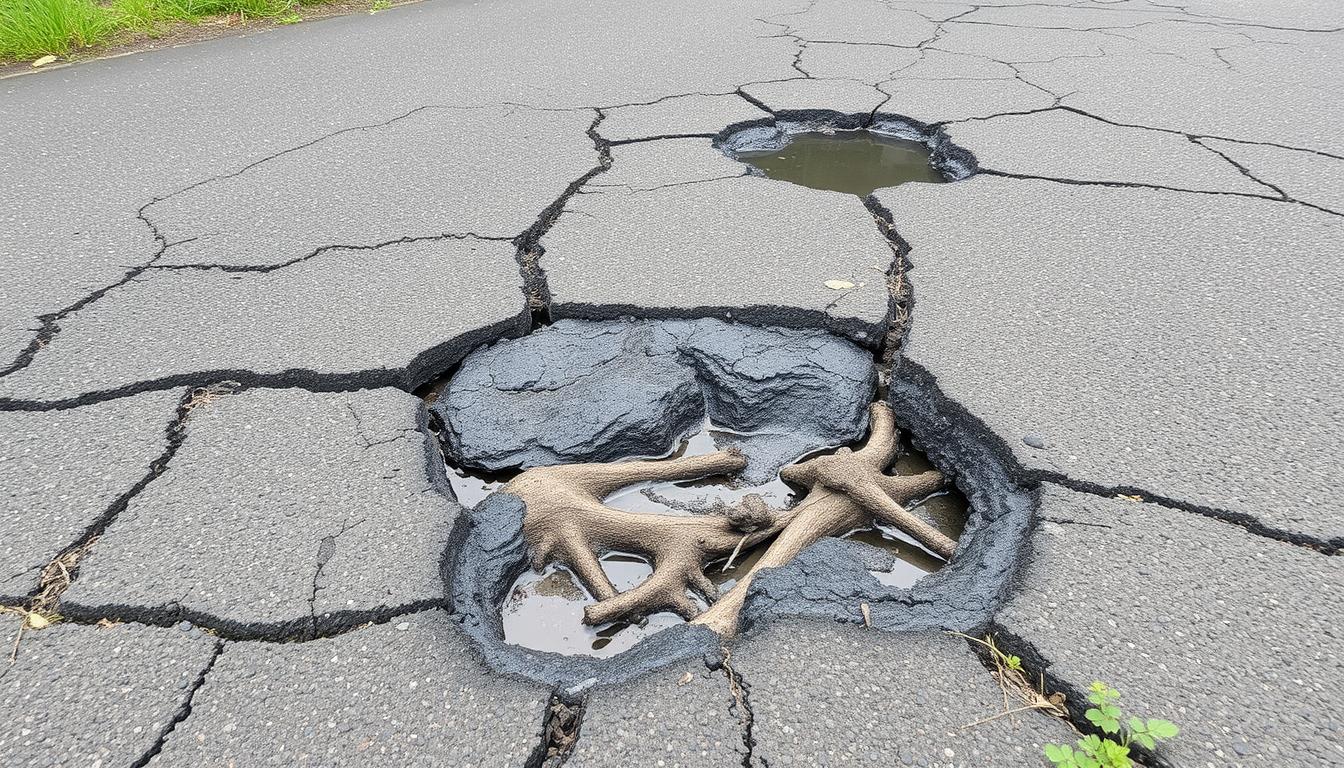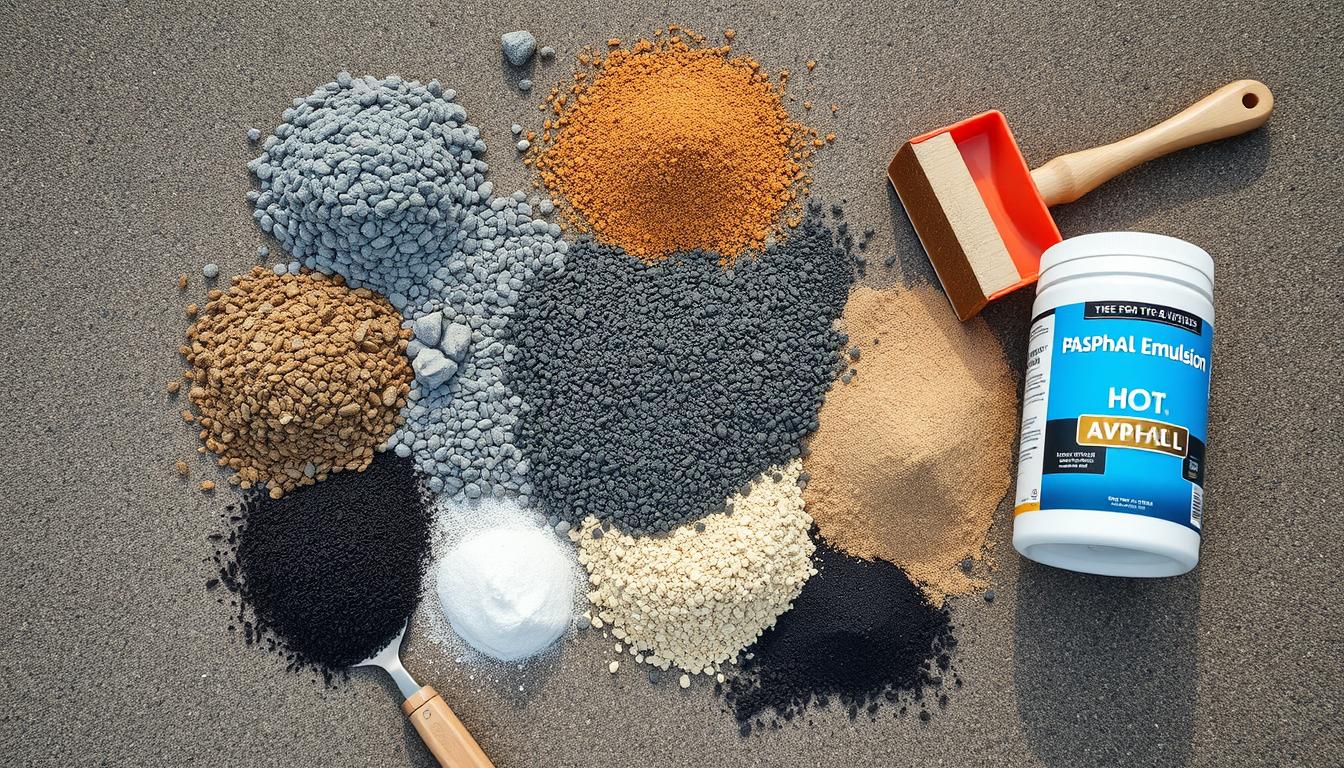Ever wondered how asphalt paving differs from concrete? Or why some driveways look sleek, while others seem rugged? This question leads us to explore the differences between asphalt and concrete paving. Both have their own benefits and drawbacks, making it important to know what each offers.
Asphalt paving is cheaper, costing 30% to 40% less than concrete. It also installs faster. But, concrete lasts longer, from 30 to 40 years, compared to asphalt’s 20 to 30 years. Knowing these differences helps you choose the right material for your project, whether it’s for your home or business.
Key Takeaways
- Asphalt paving is generally more cost-effective upfront, ranging from $2 to $4 per square foot, compared to concrete which starts at $4.
- The lifespan of concrete is significantly longer, often lasting 30 to 40 years, whereas asphalt typically lasts 20 years with proper maintenance.
- Asphalt installations cure much faster, solidifying within just a day, unlike concrete, which takes 7 to 14 days.
- While asphalt is effective in cold climates, it can suffer from heat exposure, making it important to consider local weather when choosing your paving material.
- Maintenance differs as asphalt requires sealcoating every 2 to 5 years, while concrete needs sealing every 2 to 3 years but is less frequent overall.
Introduction to Asphalt and Concrete Paving
Asphalt and concrete paving are key choices for surfaces like roads, driveways, and parking lots. Each material has its own benefits, suited for different needs. Knowing these differences helps in making the right choice for paving.
Overview of Asphalt Paving
Asphalt comes from crude oil, making it flexible and adaptable. This flexibility helps asphalt absorb minor ground movements, preventing damage. In the U.S., asphalt covers about 94% of paved roads because it’s cost-effective, with prices from $3 to $5 per square foot.
The lifespan of asphalt pavement is 15 to 20 years, depending on maintenance. It’s wise to sealcoat asphalt every 3 to 5 years to extend its life.
Overview of Concrete Paving
Concrete is made from cement, water, and aggregates, creating a strong structure. It lasts longer than asphalt, with a lifespan of 20 to 30 years. Concrete costs more to install, from $6 to $10 per square foot.
While concrete needs less repair than asphalt, these repairs are often more complex and expensive. In cold climates, concrete requires less maintenance over time, making it a good choice.
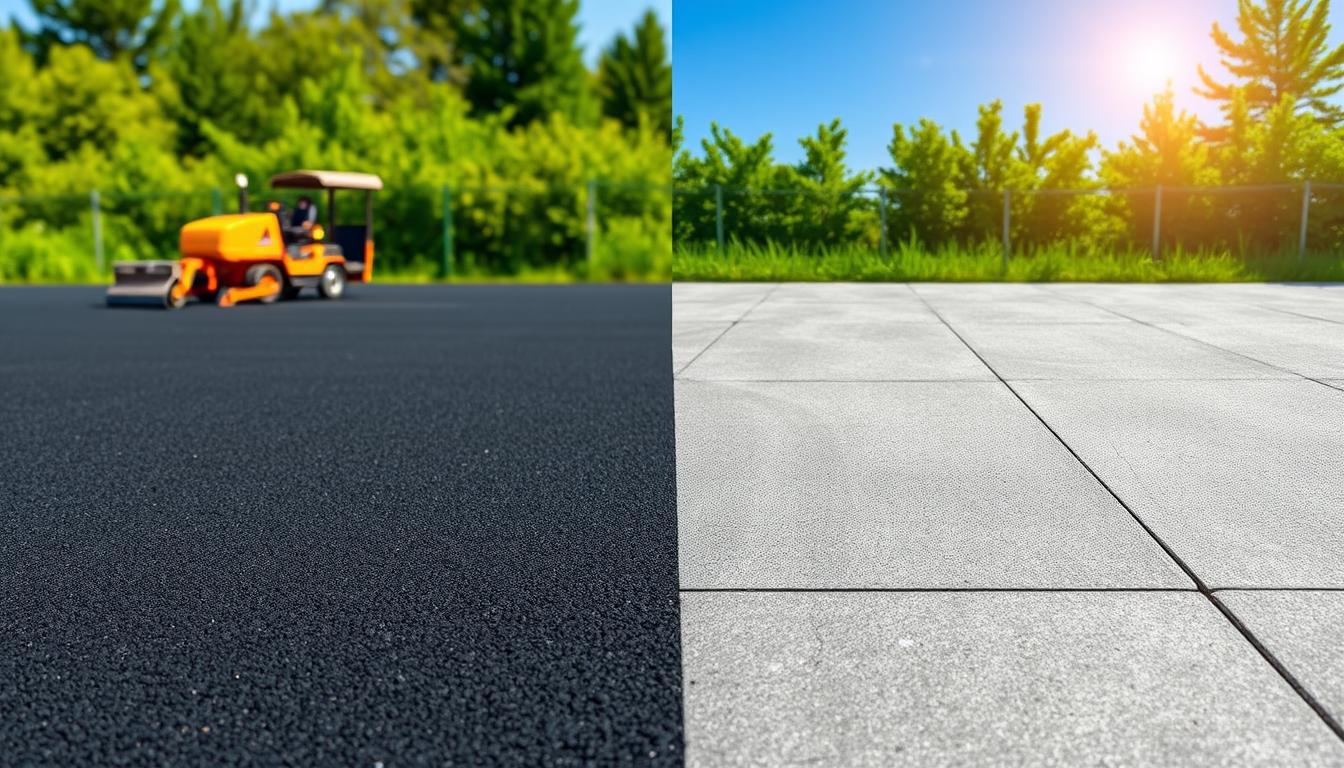
Materials Used in Paving
The materials used in paving affect how long it lasts and its environmental impact. Knowing about asphalt mixtures and concrete helps us make better choices for different projects.
Asphalt Mixtures
Asphalt mixtures are made of fine and coarse aggregates and a petroleum-based binder. This mix makes surfaces flexible and durable, adapting to changing conditions. The aggregates provide a strong base, and the binder holds everything together.
Asphalt is easy to install and cures quickly. It’s also recyclable, which is good for the environment. This makes asphalt a popular choice for many projects.
Concrete Composition
Concrete is made from Portland cement, water, sand, and gravel. This mix creates a strong and long-lasting material. It’s great for areas that need to handle a lot of weight, like driveways and commercial spaces.
Concrete also stands up well to chemicals and UV rays, keeping its look over time. Even though it’s made from natural materials, there are some environmental concerns during its production.
Installation Processes
Understanding how to install asphalt or concrete paving is key for property owners. Each method has its own way of working, affecting how long a project takes and how it’s used. Knowing these differences helps make a choice that fits your needs and likes.
Asphalt Paving Installation
Asphalt paving gets done fast, usually in one day. This means less trouble for people using the property and moving around. After it’s laid down, it takes 48 to 72 hours to get ready for use.
The steps for asphalt paving include laying down the material, compacting it, and applying sealants. This keeps it lasting longer. It’s easy to take care of, needing sealcoating every three to five years.
Concrete Paving Installation
Concrete paving needs careful planning and takes longer. It can take days, with a curing time of seven to fourteen days. This lets the concrete get strong and last longer.
The steps for concrete paving include getting the subgrade ready, pouring the concrete, and finishing it. Sealing the surface is needed every two to three years, and keeping it clean is important too.
Cost Comparison of Asphalt vs. Concrete
It’s important to know the cost of paving materials before making a choice. Asphalt is often cheaper at first. It costs between $3 to $7 per square foot, while concrete is $4 to $8. This makes asphalt about 30-40% cheaper, which is good for your wallet.
Initial Costs
The cost of both materials is a big factor. A one-car asphalt driveway costs $600 to $2,000. Concrete costs $800 to $2,300 for the same size. For a two-car driveway, asphalt is $1,200 to $4,000, and concrete is $1,600 to $6,400. Your budget can help decide which one to choose.
Long-term Cost Considerations
Think about long-term costs too. Asphalt is cheaper at first but needs more upkeep. It needs sealing every 6 to 12 months and resurfacing every 3 to 5 years. Concrete needs less care but repairs can be expensive.
Asphalt lasts 15 to 30 years, while concrete can last 30 to 50 years. This long life can save you money in the long run. So, think about both the upfront cost and the long-term costs when choosing.
Durability and Longevity
When choosing paving materials, it’s key to look at their durability and how long they last. Asphalt and concrete have different qualities that impact their lifespan. This can change based on the environment and how well they are cared for. By comparing these, property owners can pick the right material for their needs.
Asphalt Lifespan
Asphalt surfaces can last 15 to 20 years. Regular care, like sealcoating every 2 to 5 years, can extend this to 30 years. Its flexibility helps it handle cold weather better and reduces cracking.
Keeping asphalt in good shape is important. This includes filling cracks. It ensures asphalt stays reliable, even with lots of traffic.
Concrete Lifespan
Concrete driveways can last up to 40 years. In some cases, they can last over 50 years. Even though concrete costs more upfront, it’s cheaper in the long run because it lasts longer.
Concrete needs less upkeep but repairs can be bigger when problems like cracks or spalling happen. Preventive steps are key to keeping concrete in good shape, as freeze-thaw cycles can damage it.
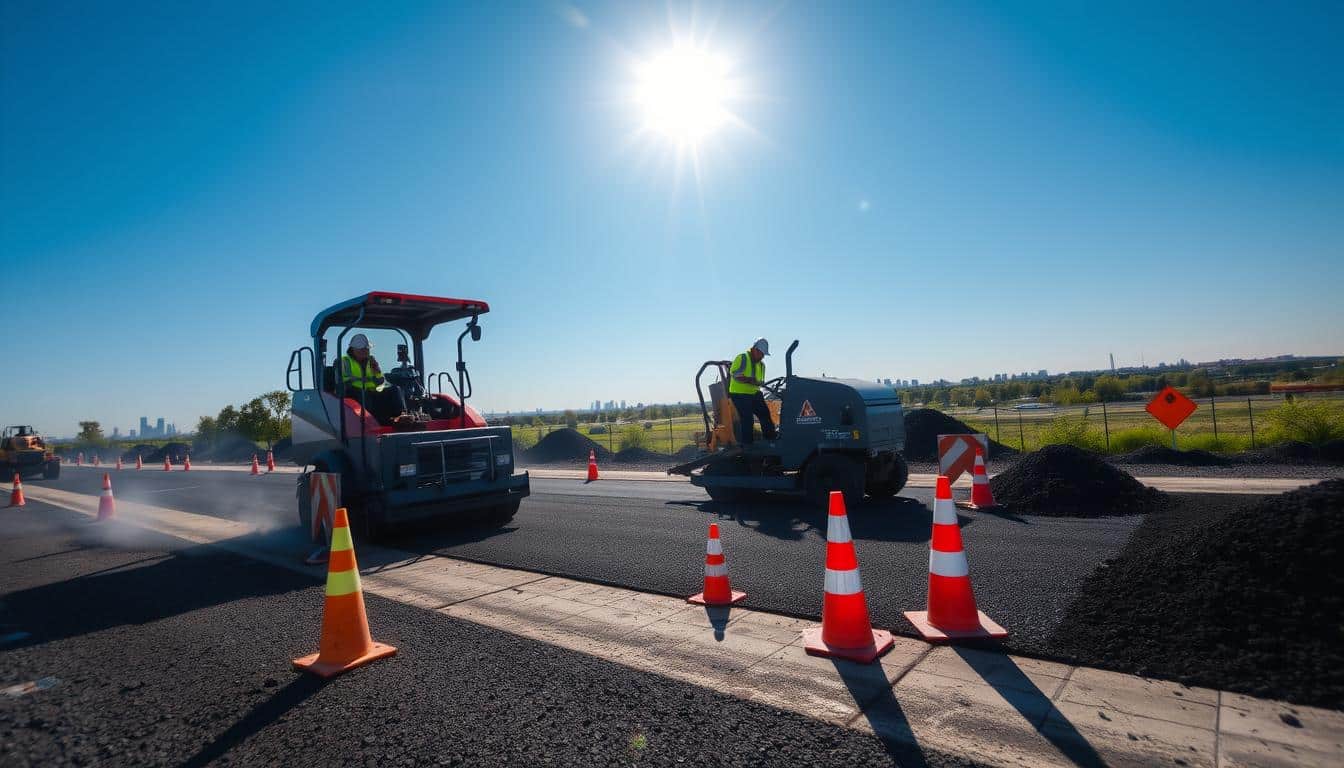
Maintenance Requirements
Keeping asphalt and concrete in good shape is key to their longevity and look. Regular care helps them face weather, traffic, and time well. Knowing what each needs helps owners make smart choices.
Asphalt Maintenance
Asphalt needs sealcoating every 2 to 5 years to fight cracks and wear. Its flexibility means it cracks less in cold, but it can soften in hot weather. Spotting and fixing problems early saves money in the long run.
Concrete Maintenance
Concrete needs less upkeep but can need big repairs for cracks or spalling. Sealants and power washing every 2 to 3 years keep it strong. It lasts longer, saving money, but ignoring problems can cost more later.
Weather Resistance
When choosing between asphalt and concrete, knowing how they handle the weather is key. Asphalt is great in cold weather because it can melt snow and ice. It’s also flexible, which is good for places with harsh winters.
Performance in Cold Climates
In cold areas, asphalt holds up better than concrete. Its ability to handle temperature changes without breaking down is a big plus. This makes asphalt a top pick for areas with really cold winters.
Concrete is strong, but it can crack in extreme cold. This affects how well it performs in freezing temperatures.
Performance in Hot Climates
In hot weather, concrete is the winner because it doesn’t soften like asphalt can. Asphalt’s softening can make it less durable and require more upkeep. Concrete stays strong, making it a better choice for hot areas.
Looking at how these materials perform in different climates helps you choose the right one for your needs.
Aesthetic Options
Aesthetics are key when picking paving materials. They affect how a space looks and works. It’s vital to compare asphalt and concrete looks and uses.
Color and Texture of Asphalt
Asphalt usually has a sleek black finish. It’s a common color, but you can make it look better with treatments. Sealing or adding aggregates can change its look a bit.
The texture of asphalt is mostly smooth. This works well for practical spaces but doesn’t offer many patterns. If you want something classic, asphalt might be for you. But, if you want more variety, it might not be the best choice.
Color and Texture of Concrete
Concrete offers a wide range of colors and textures. You can pick from smooth, brushed, stamped, or stained finishes. This makes it easy to match your style and home design.
Concrete’s flexibility lets you create unique outdoor spaces. You can choose colors and textures that set the mood of your area. This makes concrete a top pick for those wanting a special look.
Environmental Impact
The way paving materials affect the environment is key to building sustainably. Looking at asphalt and concrete shows big differences. These differences help us choose better options for our planet.
Sustainability of Asphalt
Asphalt is great because it can be recycled a lot. It often uses old asphalt, which saves new materials and cuts down on harm to the environment. Now, there’s even asphalt that lets water through, helping with stormwater and preventing floods.
Also, making asphalt uses less energy and produces fewer emissions. This is because it’s made at lower temperatures than before.
Sustainability of Concrete
Concrete is made from natural stuff but making it uses a lot of energy. This is why it’s responsible for about 8% of global CO2 emissions. Concrete driveways last longer, up to 40 years, but they don’t let water through.
This means we have to manage water carefully to avoid pollution. But, there’s a new kind of concrete that lets water drain through. This helps our cities handle stormwater better.
Choosing the Right Type for Your Project
Choosing the right paving material is a big decision. You need to know the differences between asphalt and concrete. Think about how much traffic your area gets, your budget, the weather, and what you need for your project.
Each type of paving has its own good points and not-so-good points.
Factors to Consider
When picking between asphalt and concrete, think about a few things. Asphalt costs between $6 and $9 per square foot. It’s a good choice for homes because it’s cheaper and can last up to 30 years with the right care.
Concrete, priced between $8 and $15 per square foot, is more durable. It can last up to 50 years. But, it costs more to start and needs different care.
Asphalt needs sealcoating every year and then every three to five years after that. This means you’ll have to do more maintenance over time.
Recommendations for Residential vs. Commercial Use
For homes, asphalt is often a better choice because it’s faster to install and cheaper. But, for businesses, concrete is better. It can handle a lot of traffic and weight because of its strength.
Choosing the right material affects how your space looks and how much you’ll spend on upkeep. Finding the right balance is key to a successful paving job.
HT Paving and Seal Coating Services
HT Paving serves the Bay Area with top-notch quality and customer satisfaction. We are a family-owned business with over 15 years of experience. We focus on safety and efficient project management, ensuring every asphalt paving project meets high standards.
Our services include seal coating and driveway repairs. We aim to improve paving quality for both homes and businesses.
Our Commitment to Quality
At HT Paving, we aim to make your paved surfaces last longer. Regular maintenance, like sealcoating every 2-3 years, can make asphalt last 15-25% longer. We pay close attention to detail, sealing cracks and protecting surfaces from weather.
With nearly 40 years of experience, we offer reliable services. Whether it’s a new installation or maintaining your driveway, we’ve got you covered.
Customer Testimonials
Our customers often share how HT Paving improved their properties. They say hiring a licensed contractor boosts property value and curb appeal. Well-maintained driveways can even make homes sell faster.
For more on our services, including seal coating services, visit our site. See how we can meet your paving needs.
Contact HT Paving for Your Paving Needs
HT Paving offers top-notch paving services in the Bay Area. We help improve your property’s look or make high-traffic areas safe. Our team is ready to help with both home and business needs, ensuring a lasting finish.
Service Areas in the Bay Area
HT Paving covers many places in the Bay Area. We serve Hayward, Alameda, San Leandro, Fremont, and more. We use green disposal methods and focus on quality service. Our goal is to make you happy with our affordable and reliable paving.
Get in Touch with Us at (415) 774-6424
Ready to start your paving project or have questions? Call HT Paving at (415) 774-6424. Our team is ready to offer personalized service. Let us help turn your ideas into reality!
